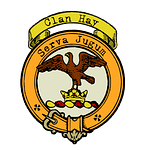Welcome back to the “A Clan A Day Podcast,” brought to you by bagtownclans.com. I’m your host, Colin MacDonald. Today, we’re diving into the fascinating history of Clan Maitland, a family of Norman origin with a lineage that has woven itself deeply into Scottish history. Known for their loyalty, political influence, and military valor, the Maitlands hold a special place among the Lowland clans of Scotland, with origins dating back to the 11th century.
The story of Clan Maitland begins in Normandy, with the name originally spelled as Mautalent, Matulant, or Matalan. Derived from Old French, "Mautalent" roughly translates to “evil genius” or “ill-tempered.” It’s likely this was a nickname taken on by the first member of the family to emphasize strength or strike fear. The Mautalents hailed from Les Moitiers d’Allonne, near Carteret in Normandy, and were among the Normans who crossed into England with William the Conqueror in 1066. The Maitland name first appears in Northumberland during the 12th and 13th centuries, showing their early presence in Northern England before the family expanded into Scotland.
The first Maitland to make a mark in Scotland was Thomas de Matulant, a member of the Anglo-Norman nobility, who flourished during the reign of King William the Lion and passed away in 1288. His grandson, Sir Richard Matulant, became one of the most powerful Lowland barons, holding significant lands in Berwickshire, including Thirlestane, Blythe, Tollus, and Hedderwick. Sir Richard’s holdings and alliances made him an influential figure in the Borders, and he solidified the clan’s standing through generous donations to the church, contributing land to Dryburgh Abbey for the well-being of his soul and family.
Sir Richard’s son, William de Mautlant, took up the patriotic cause of Robert the Bruce during the Wars of Scottish Independence and joined Bruce’s supporters as he asserted his right to the throne. Sadly, William died around 1315, but the legacy he established would carry forward, with his sons giving their lives for Scotland at the Battle of Durham in 1346.
Through successive generations, the Maitlands continued to grow in power and influence. A notable descendant, Sir Robert Maitland, was given command of Dunbar Castle, although he later surrendered it to the Earl of Douglas, avoiding ruin. His son, Robert Maitland, became one of the hostages exchanged for the liberation of King James I in 1424—a testament to the clan’s standing in Scottish affairs.
The Maitlands remained steadfast in their allegiance to Scotland. Sir William Maitland of Lethington, a clan member, died at the Battle of Flodden in 1513, alongside King James IV. His son, Sir John Maitland, elevated the family even further, becoming the 1st Lord of Thirlestane and marrying the heiress of Lord Fleming, thus intertwining the Maitland legacy with another noble lineage. Sir John held the influential title of Lord High Chamberlain of Scotland during Queen Mary’s reign, and his son would eventually become the first Earl of Lauderdale.
This loyalty to the crown—and especially to Mary, Queen of Scots—defined the Maitlands during the turbulent years of the 16th century. Anne Maitland, sister of the 1st Earl, married Robert, Lord Seton, which reinforced Maitland alliances with the powerful Setons. Despite Queen Mary’s declining fortunes, the Maitlands remained loyal supporters. William Maitland, also known as Secretary Lethington, was a close confidante to Mary, navigating the complex and often dangerous waters of Scottish politics. He supported her marriage to James Hepburn, the 4th Earl of Bothwell, yet later joined the nobles against her at the Battle of Carberry Hill. Caught between loyalties, he was declared a traitor by Parliament in 1573, marking a moment of significant turmoil for the family.
The clan’s influence continued to flourish during the 17th century. John Maitland, the 2nd Earl of Lauderdale, was an ardent supporter of Charles II, enduring imprisonment in the Tower of London after the Battle of Worcester in 1651. With the Restoration, he rose to become one of the most powerful men in Scotland, assuming roles as Secretary of State and Lord High Commissioner. In 1672, he was created the 1st Duke of Lauderdale, although he would be the first and last to hold this title. The Duke of Lauderdale is also credited with converting Thirlestane Castle into a Renaissance palace, adding a touch of grandeur that befitted his elevated station.
In the 18th century, the Maitlands managed to avoid the devastation brought to many Scottish families by the Jacobite risings. While Prince Charles Edward Stuart and his Jacobite army camped on their lands at Thirlestane after the Battle of Prestonpans, the Maitlands were not prominent Jacobites, and as a result, they escaped forfeiture. In the Napoleonic Wars of the early 19th century, the Maitlands once again found themselves at the forefront. General Sir Peregrine Maitland commanded the Foot Guards at the Battle of Waterloo, and Captain Frederick Maitland of the Royal Navy famously accepted Napoleon’s surrender.
Thirlestane Castle remains the heart of Clan Maitland, a monument to the family’s remarkable history and resilience. The Maitlands are also associated with Lennoxlove House, formerly known as Lethington, which passed into the Blantyre-Stewart family in the 18th century. The Maitland name is equally linked to the Maitland Club, a text publication society founded in 1828 to honor the clan’s literary heritage, particularly Richard Maitland of the 16th century, who was a celebrated historian and poet.
Today, the Maitland legacy is preserved under the leadership of Ian Maitland, the 18th Earl of Lauderdale. As Hereditary Saltire Banner Bearers of Scotland, the Maitlands continue to honor their heritage and contributions to Scottish history. Their motto, "Consilio et Animis"—“By wisdom and courage”—serves as a fitting tribute to a family whose journey has been marked by loyalty, bravery, and an enduring commitment to their country.
Thank you for joining us on today’s journey into the history of Clan Maitland. I’m Colin MacDonald, and this has been “A Clan A Day Podcast.” Tune in tomorrow as we uncover the history of another Scottish clan. Go n-éirí an bóthar leat!













Share this post